|
Author
|
Topic: My personal Apollo story (Dan Schaiewitz)
|
Daniel on the Moon
Member Posts: 354
From: Bronxville, NY
Registered: Jun 2015
|
 posted 12-24-2015 11:55 AM
posted 12-24-2015 11:55 AM
   
Ever since I can remember, I wanted to be an astronaut. When President Kennedy made landing a man on the moon a national goal, I wanted to become involved in the lunar landing program. I established my long range goals, i.e. obtaining a degree in engineering and getting a job involved with the complexities of keeping a man alive on the moon.After obtaining my engineering degree in 1967, I was fortunate enough to have been offered a position with the company that had the contract for the Apollo Portable Life Support System (PLSS) which included the Emergency Oxygen Supply System called the "Oxygen Purge System" (OPS). I arrived at Cape Kennedy Thanksgiving Day, 1968. I was so excited that I forgot it was a holiday and spent the entire day at the Visitors Information Center. Seeing the Vehicle Assembly Building, the Apollo 8 rocket on pad 39 and the rest of the space center was beyond the realm of my imagination. It was difficult to believe that I would be a part of a team that would change science fiction to science fact. As I began my assignment at the Kennedy Space Center, I became very inquisitive and was determined to get involved in every way possible. I read every document and manual related to space suit operations I could get my hands on. As we got closer to Apollo 11, the mission the whole world was looking forward to, I realized that I was an important part in making the mission a success. I worked six and seven days a week, 16 to 18 hours a day much of it on my own unpaid time looking for and "making" work. I felt guilty getting paid for the one thing I always dreamed of doing. One of my most vivid memories was charging the Apollo 11 Life Support Systems. Four individuals, one technician, two quality control personnel and myself adding the life sustaining water and oxygen to the hardware that would be used in just a few days to support the first humans to walk on the moon. I felt a lot of pride along with a lot of butterflies. Alone one night at about 1AM at our KSC office, I found a memo that stated the Apollo 11 astronauts (Armstrong and Aldrin) were coming to KSC to practice their lunar surface activities and that our support would be needed. The following day I contacted the Manned Spacecraft Center in Texas to find out all I could about the support that would be required. I then informed responsible parties at KSC of my desire to handle the support required without it interfering with my other responsibilities. Subsequently I was assigned the position of Extravehicular Crew Training Engineer at KSC. The Apollo 11 training exercises went so well at KSC that the Apollo training office at the Manned Spacecraft Office in Texas decided to conduct most of the lunar surface training exercises at KSC. One of the many aspects that made my "adventure" in the crew training area so interesting were the many times that I explained the functional aspects of the Astronaut Life Support System to so many inquisitive people, i.e. workers, reporters, dignitaries, etc. Being so interested in and so enthusiastic about my work, it gave me much pleasure and satisfaction to convey my enthusiasm to others. I will never forget the first opportunity to wear the Apollo space suit, more specifically Neil Armstrong's suit. The scene took place in our "clean room". The purpose was to check out the Apollo 11 PLSS communications from the Space Suit to the Spacecraft on Pad 39 to The Manned Spacecraft Center in Houston, Texas. The date was May 5, 1969. What an incredible experience knowing that I was verifying that the Spacesuit communications from the moon to earth and back was in fact working as designed to transmit the voices of the first men on the moon to the entire world. 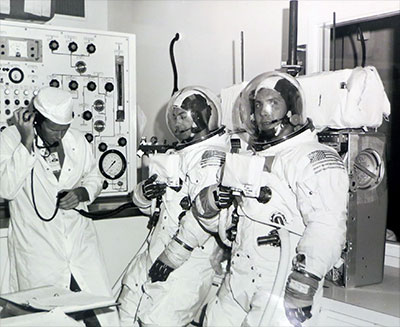 Above: Here I am checking Apollo 11 communications. Subsequently, I had many opportunities to work with and test procedures using Apollo suits. Being intimately familiar with the procedures used by the astronauts inside the Lunar Module (LM), I was delegated to wear the space suits to develop, troubleshoot and verify procedures used by the astronauts. How close to actually being an astronaut can you get! 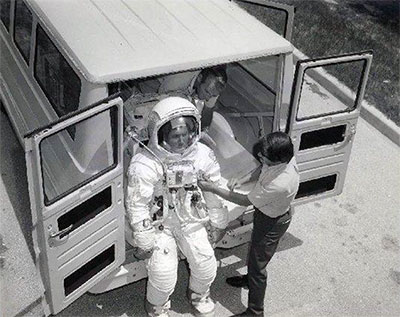 Above: Here I am on my way to the simulated lunar surface outside the KSC crew training building to test out modifications made to the life support training "backpacks." 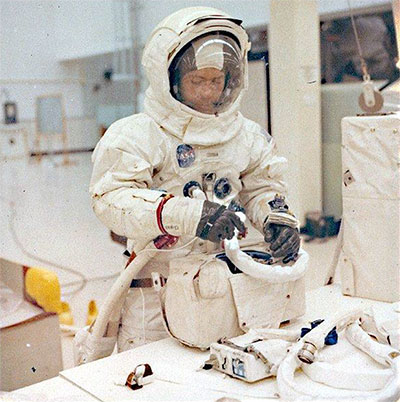 Above: Here I am going through EVA prep and post procedures before the astronauts went through the same procedures. 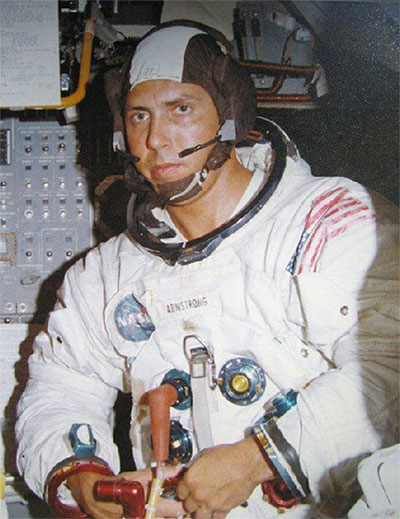 Above: Here I am evaluating Apollo 11 prep and post procedural changes before the Apollo 11 liftoff in the training LM at KSC wearing Armstrong's training suit. My most memorable experience was the "journey" to the Apollo 11 spacecraft the night before the Apollo 11 launch to deliver the Astronaut Suit Life Support Equipment and "stow" it in the Lunar Module. There we were, four of us riding along the same route the giant crawler carried the 40 story rocket to pad 39. The destination of that monstrous rocket could be seen that night as a beautiful half sphere. While riding toward the spacecraft, I kept having flashbacks of moon rockets I had seen in "Flash Gordon and Captain Video" TV series of the early 1950s. The closer we got to the base of the Saturn V rocket the faster the "butterflies fluttered"! Then the elevator ride to the Lunar Module level 36 stories high. The ride to our LM destination seemed endless as I watched the diameter of the rocket get smaller and smaller. When we passed the giant American Flag painted on the side of the rocket I felt proud to be an American. Once inside the protective room that surrounded the Lunar Module, we removed the two Portable Life Support Systems (PLSS) and The Emergency Oxygen Purge Systems (OPS) from their protective containers. We then installed the hardware in their respective stowage locations. I had the distinction of crawling through the LM hatch into the LM to make the final verification of the PLSS controls and switches. I again could not believe where I was and how I got there. It was hard to comprehend that in just a few days these amazing Life Support Systems ("backpacks") would help make one of man's oldest dreams come true. With respect to succeeding missions, I'll never forget the instance that my name was referred to by Apollo Astronaut Eugene Cernan commander of the Apollo 17 flight while on the lunar surface. |
Kite
Member Posts: 1163
From: Northampton UK
Registered: Nov 2009
|
 posted 12-24-2015 12:21 PM
posted 12-24-2015 12:21 PM
  
What a fantastic story. Thanks for sharing it with us Daniel. As someone who lived through those times what I'd done to change places with you. |
p51
Member Posts: 1786
From: Olympia, WA
Registered: Sep 2011
|
 posted 12-24-2015 12:28 PM
posted 12-24-2015 12:28 PM
   
Wow!Thanks for posting that, I never thought of anyone testing out the suits like that. Just goes to show you really DO learn something new every day! |
chet
Member Posts: 1552
From: Beverly Hills, Calif.
Registered: Nov 2000
|
 posted 12-24-2015 12:37 PM
posted 12-24-2015 12:37 PM
   
Thank you, Mr. Schaiewitz, for sharing your story, and the photos of you performing your duties prior to the launch of Apollo 11.(For space junkies, how much more Walter Mitty-like could an experience get?) |
space1
Member Posts: 951
From: Danville, Ohio
Registered: Dec 2002
|
 posted 12-24-2015 04:31 PM
posted 12-24-2015 04:31 PM
   
Thanks for sharing such an amazing story. When will such dreams be lived again in human history?Were you just extremely lucky to be Armstrong's size, or was a close fit not really important for your tests? |
Daniel on the Moon
Member Posts: 354
From: Bronxville, NY
Registered: Jun 2015
|
 posted 12-24-2015 04:52 PM
posted 12-24-2015 04:52 PM
   
quote:
Originally posted by space1:
Were you just extremely lucky to be Armstrong's size, or was a close fit not really important for your tests?
A close fit was not a priority, although, I was fairly close to Armstrong's size. There was enough "wiggle" room in the suits allowing me to also conduct tests in both Shepard and Cernan's PGAs. |
stsmithva
Member Posts: 2105
From: Fairfax, VA
Registered: Feb 2007
|
 posted 12-24-2015 07:33 PM
posted 12-24-2015 07:33 PM
   
Fantastic! A real pleasure to learn about. |
mach3valkyrie
Member Posts: 764
From: Albany, Oregon
Registered: Jul 2006
|
 posted 12-24-2015 10:29 PM
posted 12-24-2015 10:29 PM
   
Thanks for sharing your experiences! |
Mike Dixon
Member Posts: 1625
From: Kew, Victoria, Australia
Registered: May 2003
|
 posted 12-24-2015 10:41 PM
posted 12-24-2015 10:41 PM
   
Amazing story and I thank you for telling it |
bunnkwio
Member Posts: 114
From: Naperville, IL USA
Registered: Jul 2008
|
 posted 12-25-2015 12:01 AM
posted 12-25-2015 12:01 AM
   
Such a fantastic story and amazing photographs! To have a pictures showing "oh yeah, that's me in Armstrong's training suit". WOWZA!!Thank you so much for sharing!! |
East-Frisian
Member Posts: 682
From: Germany
Registered: Apr 2005
|
 posted 12-25-2015 02:29 AM
posted 12-25-2015 02:29 AM
  
Raelly great story. Thank you.
|
Indy500
Member Posts: 24
From: Indianapolis, IN, USA
Registered: Jun 2015
|
 posted 12-25-2015 03:28 AM
posted 12-25-2015 03:28 AM
   
Awesome story! Thanks for sharing! |
Rick Mulheirn
Member Posts: 4600
From: England
Registered: Feb 2001
|
 posted 12-25-2015 06:20 AM
posted 12-25-2015 06:20 AM
  
Awesome story Dan. Great photos. Great memories. |
Joel Katzowitz
Member Posts: 891
From: Marietta GA USA
Registered: Dec 1999
|
 posted 12-25-2015 08:12 AM
posted 12-25-2015 08:12 AM
   
What an amazing experience to carry around in your head. Thank you for sharing. |
mark plas
Member Posts: 385
From: the Netherlands
Registered: Aug 2000
|
 posted 12-25-2015 08:45 AM
posted 12-25-2015 08:45 AM
   
Forgot to close my mouth while reading! Just Wow! |
Robert Pearlman
Editor Posts: 53503
From: Houston, TX
Registered: Nov 1999
|
 posted 12-25-2015 08:53 AM
posted 12-25-2015 08:53 AM
   
quote:
Originally posted by Daniel on the Moon:
I'll never forget the instance that my name was referred to by Apollo Astronaut Eugene Cernan commander of the Apollo 17 flight while on the lunar surface.
This closing tidbit was too good not to follow up (how many people can say they've had a shout out from the moon?) and so here's the relevant passage from Apollo 17's EVA-1 on the Apollo Lunar Surface Journal... 116:46:42 Cernan: Got it. (Pause) I'm going to miss Danny being out there to hand us those light PLSSs.116:46:48 Schmitt: That's right. (Pause) [This is a reference to training exercises. They had practiced donning full-sized PLSSs inside the LM and then trade those for smaller, lightweight units once they were outside. Danny Schaiewitz was the engineer who handed them in. He worked for the manufacturer, Hamilton-Standard. According to Ed Brisson, who headed up the Hamilton-Standard operation at the Cape, Schaiewitz was well liked by the crews and socialized with many of them.] |
KSCartist
Member Posts: 3096
From: Titusville, FL
Registered: Feb 2005
|
 posted 12-25-2015 05:42 PM
posted 12-25-2015 05:42 PM
   
Thank you for sharing your story and for your service to space exploration.You might contact the US Space Walk of Fame Foundation in Titusville. They have been conducting oral histories for years. |
Cozmosis22
Member Posts: 1115
From: Texas * Earth
Registered: Apr 2011
|
 posted 12-25-2015 08:56 PM
posted 12-25-2015 08:56 PM
  
Congratulations for your dedication to he program. That is a fabulous bit of history.Thanks for the "Christmas present."  |
RobertB
Member Posts: 281
From: Israel
Registered: Nov 2012
|
 posted 12-25-2015 11:22 PM
posted 12-25-2015 11:22 PM
   
I'd like to know how tempted you were to stow away.  |
Daniel on the Moon
Member Posts: 354
From: Bronxville, NY
Registered: Jun 2015
|
 posted 12-26-2015 01:17 AM
posted 12-26-2015 01:17 AM
   
quote:
Originally posted by Kite:
As someone who lived through those times what I'd done to change places with you.
Thank you reading my post and thank you for your comment. I had a dream and I was lucky enough to be in the right place at the right time. |
Daniel on the Moon
Member Posts: 354
From: Bronxville, NY
Registered: Jun 2015
|
 posted 12-26-2015 01:29 AM
posted 12-26-2015 01:29 AM
   
quote:
Originally posted by KSCartist:
You might contact the US Space Walk of Fame Foundation in Titusville.
Thank you for your suggestion and thank you for taking time out to read about my once in a life time "dream" come true. |
Daniel on the Moon
Member Posts: 354
From: Bronxville, NY
Registered: Jun 2015
|
 posted 12-26-2015 02:24 AM
posted 12-26-2015 02:24 AM
   
quote:
Originally posted by RobertB:
I'd like to know how tempted you were to stow away.
The obvious answer most "space junkies" would give is a resounding YES. However, my answer to your question would probably be either "yes with reservations" or even "no". Being as intimately involved with the complexities of the project and hardware on an everyday basis and witnessing test failures, design changes, procedural changes and then try to make "optimism trump pessimism" was difficult and I believe that a majority of workers that were involved with the daily successes and failures were pessimistic but none of us talked about it. The 24/7 schedule to meet deadlines didn't give us time to think or dwell about our pessimism. The fact that you were where you were and doing what you were doing created an incredibly exciting and motivating experience day in and day out. The fact that the ultimate objective to reach the moon was realized made me as well as most workers extremely proud along with a "sigh of relief" that everything "worked". As I look back 40+ years later, I realize that I could have been more pessimistic than I was knowing that we did not have use of technology we have today, one of the most obvious example being the "stone age" computing power that was used. It is more "mind boggling" today than it was then for obvious reasons. |
Chariot412
Member Posts: 164
From: Lockport, NY, 14094
Registered: Jun 2011
|
 posted 12-26-2015 09:18 AM
posted 12-26-2015 09:18 AM
   
I love this story. |
Jonnyed
Member Posts: 620
From: Dumfries, VA, USA
Registered: Aug 2014
|
 posted 12-26-2015 07:26 PM
posted 12-26-2015 07:26 PM
   
Danny, what a great story. I imagine that like a lot of us you are also a space artifact collector / signature collector - true?If so, what are two or three of your favorite items in your collection? I imagine your "insider" position allowed you to get some pretty cool stuff. |
Daniel on the Moon
Member Posts: 354
From: Bronxville, NY
Registered: Jun 2015
|
 posted 12-26-2015 09:12 PM
posted 12-26-2015 09:12 PM
   
quote:
Originally posted by Jonnyed:
If so, what are two or three of your favorite items in your collection?
My most prized possessions are two Sterling Silver Charms that Charlie Duke and John Young brought to the moon and back in their Personal Preference Kit (PPK). Letters from other moon walking astronauts thanking me for my effort(s) rank very high! |
ApolloEra
Member Posts: 23
From: Sherman Oaks, CA, USA
Registered: Feb 2013
|
 posted 12-26-2015 10:34 PM
posted 12-26-2015 10:34 PM
   
Thank you so much for sharing, and especially the one-of-a-kind photos! Happy Holidays! |
GACspaceguy
Member Posts: 3121
From: Guyton, GA
Registered: Jan 2006
|
 posted 12-27-2015 06:49 AM
posted 12-27-2015 06:49 AM
   
No disrespect to Star War fans but this is the best spaceflight story this month! Reality trumps sci-fi every time!! What a fantastic history to have!I have often said in various recruitment efforts that it was not Velcro and other material that were spinoffs from the program it was scientists and engineers. Danny you said: "When President Kennedy made landing a man on the moon a national goal, I wanted to become involved in the lunar landing program. I established my long range goals, i.e. obtaining a degree in engineering..." Graduating in 1967 and two years later working Apollo equipment and doing the install before flight, WOW, how amazing is that for a young engineer! Thanks for sharing, as said above thanks for the Christmas present. |
intrepid12
Member Posts: 16
From: decatur,il
Registered: Jun 2010
|
 posted 12-27-2015 11:00 AM
posted 12-27-2015 11:00 AM
  
Thanks for sharing, I really enjoyed reading. Feel free to share more. |
Jonnyed
Member Posts: 620
From: Dumfries, VA, USA
Registered: Aug 2014
|
 posted 12-27-2015 08:12 PM
posted 12-27-2015 08:12 PM
   
Danny, sorry to ask a somewhat uninformed question but I imagine that none of the Apollo PLSSs used on the lunar surface ever made it back from the moon trips (i.e., they're still stowed in the LM ascent stages). Is that correct?Also, did the Apollo 13 PLSSs ever come into play during that ordeal? Thanks again for sharing your story. |
Daniel on the Moon
Member Posts: 354
From: Bronxville, NY
Registered: Jun 2015
|
 posted 12-28-2015 12:49 AM
posted 12-28-2015 12:49 AM
   
The two PLSSs were "tossed" out the hatch along with other items used and no longer needed to save as much weight as possible for LM ascent stage lunar liftoff. The more non needed equipment jettisoned, the more rock samples they were able to return to earth. There were LM ascent stage liftoff target weights including a factor of safety. All equipment weights were known prior to earth liftoff. the only unknown were the lunar rock sample weights. However, those weights were determined prior to LM liftoff using a scale. With all weights known, a "go"/"no go" based on weight was easy to determine. One other interesting fact: The Oxygen Purge Systems (OPS) were not left on the moon. One OPS was used by the CMP (mounted behind his EVVA) to do an EVA through the CM hatch to retrieve the cassette in the SIM Bay. Also, if a contingency transfer (as a result of a LM/CM docking problem) was needed the OPSs would have been used (mounted around the waist).With respect to your Apollo 13 question, "Did the PLSS's come into play." The answer is no. However, Contingency procedures were written "real time" during the mission for possible PLSS use for the following situations: 1) To Use PLSS Water in the LM ECS For Cooling, 2) To Use PLSS Feedwater for Drinking. I hope I've been able to satisfactory answer your questions. If you need further clarification, please don't hesitate to ask. |
Tykeanaut
Member Posts: 2280
From: Worcestershire, England, UK.
Registered: Apr 2008
|
 posted 12-28-2015 06:13 AM
posted 12-28-2015 06:13 AM
   
Amazing! Your story would also make a great contribution to the BIS Spaceflight magazine too. |
Paul78zephyr
Member Posts: 814
From: Hudson, MA
Registered: Jul 2005
|
 posted 12-30-2015 09:11 AM
posted 12-30-2015 09:11 AM
  
Great story. Thank you for sharing. Where exactly was the access to the LM with the vehicle stacked on the pad?
|
Daniel on the Moon
Member Posts: 354
From: Bronxville, NY
Registered: Jun 2015
|
 posted 12-30-2015 10:45 AM
posted 12-30-2015 10:45 AM
   
The LM had two hatches: the "overhead hatch" and the "forward hatch."The "overhead hatch" was used for docking with the Command Module (CM) in both earth and lunar orbit and was the "path" used by the CDR and LMP to enter and exit the LM when docked with the CM.
"Stacked" on Pad 39 in launch configuration, the LM was located vertically below the CM with its "overhead hatch" facing the CM heat shield. Access into the LM was provided through the horizontally located "forward hatch" via a horizontal "bridge" from the gantry elevator. The entry from the elevator exit to the open LM forward hatch was covered to provide a "clean room" environment. Before entering the LM to stow equipment (in our case the PLSSs, OPSs and RCUs) we had to take off our shoes and dress in the familiar clean room white suits. |
ejectr
Member Posts: 2025
From: Killingly, CT
Registered: Mar 2002
|
 posted 12-30-2015 01:34 PM
posted 12-30-2015 01:34 PM
   
Did you work for Hamilton Standard in Windsor Locks, CT? I've been there many times when I sold them computerized machine tools to make their equipment. |
Daniel on the Moon
Member Posts: 354
From: Bronxville, NY
Registered: Jun 2015
|
 posted 12-30-2015 01:54 PM
posted 12-30-2015 01:54 PM
   
Yes, I did work for Hamilton Standard. I began with HSD in 1967. After being in Windsor Locks for a little more than a year, there was an opening for an engineer at the HSD KSC office. Being single at 24 with no family obligations, I of course accepted the position at KSC. It was the best decision I ever made (besides marrying my incredible wife). |
Paul78zephyr
Member Posts: 814
From: Hudson, MA
Registered: Jul 2005
|
 posted 12-31-2015 10:05 PM
posted 12-31-2015 10:05 PM
  
quote:
Originally posted by Daniel on the Moon:
The entry from the elevator exit to the open LM forward hatch was covered to provide a "clean room" environment.
Danny, I am familiar with the design and configuration of the LM and its hatches. What I'm trying to understand is how those hatches were accessed with the LM enclosed in the Saturn V SLA/adapter section. Was there a hatchway in one of the SLA petals or what?This 2009 cS thread in response to a slightly different question does not answer the question either. |
Paul78zephyr
Member Posts: 814
From: Hudson, MA
Registered: Jul 2005
|
 posted 01-01-2016 02:42 PM
posted 01-01-2016 02:42 PM
  
I found this pic on Historic Space Systems.It shows the CSM/LM/SLA prior to install on top of the S-IVB. You can see what appears to me a squarish 'hatch' on the SLA panel facing the camera. You can also see that the LMs forward hatch (not visible) would be located behind there in about that same area as you can see the landing leg ladder. Can anyone say if that is in fact the access hatch to the LMs forward hatch? |
Daniel on the Moon
Member Posts: 354
From: Bronxville, NY
Registered: Jun 2015
|
 posted 01-01-2016 04:11 PM
posted 01-01-2016 04:11 PM
   
Here's another SLA photo showing the SLA LM porch access hatch: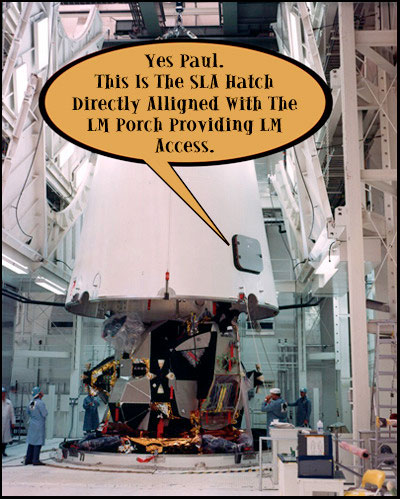 |
sev8n
Member Posts: 266
From: Dallas TX USA
Registered: Jul 2012
|
 posted 01-01-2016 05:23 PM
posted 01-01-2016 05:23 PM
  
quote:
Originally posted by Paul78zephyr:
You can see what appears to me a squarish 'hatch' on the SLA panel facing the camera.
In that photo the SLA (and CM/SM) is wrapped in a protective fabric cover. The hatch you see is a flap in the fabric cover. Behind it is an access door on the SLA panel to enter the SLA and access the LM.
|
Paul78zephyr
Member Posts: 814
From: Hudson, MA
Registered: Jul 2005
|
 posted 01-01-2016 08:13 PM
posted 01-01-2016 08:13 PM
  
Thanks Danny and sev8n. So the horizontal bridge from the clean room/gantry led right to this hatch — that's very interesting. Was the fabric cover and its 'flap' over the SLA hatch installed during the time that you accessed the LM inside the SLA? How much space was there between the SLA hatch and the LM forward hatch? How difficult was it to get in/out of the LM through the SLA hatch/forward hatch with the vehicle on the pad in a 1G environment considering the LM had really be structurally designed for 1/6 G? |

















